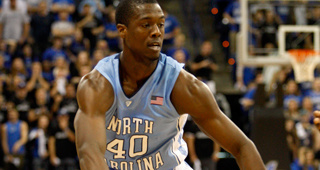When Harrison Barnes decided to forgo becoming a lottery pick in 2011 to return to school, his decision was nearly universally applauded. After recovering from a slow start to his college career, Barnes had come on strong at the end of last season, catching fire offensively as North Carolina made it all the way to the Elite Eight.
With John Henson and Tyler Zeller set to return as well, the Tar Heels were one of the preseason title favorites, with many expecting Barnes to take his place among the Tar Heels greats as a sophomore. Barnes indicated that one of the reasons he stayed was to “build his brand” an extra season by taking advantage of the huge spotlight the NCAA and the media give the sport’s top players.
However, instead of taking the next step as a player, Barnes’ statistics barely improved this season while the Tar Heels once again fell a game short of the Final Four. All that extra exposure has only served to magnify his flaws as a player, and there’s a very good chance he will end up regretting his decision to return to school for his sophomore season.
Barnes was one of the most heralded high school recruits in recent memory, the first freshman to be named a preseason All-American since voting for the awards began in 1986-87. As a result, college basketball fans, most of whom had never seen him play before, expected the 6’8 small forward to put together the same type of dominant freshman season as Carmelo Anthony, Kevin Durant and Michael Beasley had.
However, now that we have a sample size of 75 collegiate games, one thing is pretty clear: Barnes isn’t that type of player. He’s an extremely skilled 6’8, 215 small forward with a good handle and an excellent jump shot, but he doesn’t have the athletic ability of an All-NBA caliber performer.
Even in college, Barnes can’t consistently get into the lane and score at the rim. His point averages -- 15.6 as a freshman, 17.1 as a sophomore -- are fairly empty; most of his field goal attempts come on contested jumpers from 15-20 feet away, the most inefficient shot in the game. Without the quickness and athleticism to blow by his defenders, Barnes rarely creates easy looks for his teammates. In two seasons, his career assist to turnover ratio is a paltry 0.68.
That same lack of athleticism prevents him from being much of a factor on the other side of the ball. While he should be able to hold his own as a small forward, he won’t have much positional versatility in defending bigger power forwards or faster shooting guards. It’s no coincidence the much more athletic Reggie Bullock, who could end up having a better pro career, was given the more challenging defensive assignments in North Carolina's final two games.
Like Jimmer Fredette, Barnes is an excellent shooter who projects as a decent shot-creator at the next level but who won’t make much of an impact as a playmaker, rebounder or defender. He’ll be a much more valuable NBA player because of his size, but his ceiling is Danny Granger, not Kevin Durant. And instead of being almost a lock for the top-5 in 2011, there’s a good chance he falls to the latter stages of the lottery in 2012.
What made Barnes such a magnificent prospect coming out of high school was the level of polish in his game. He came to Chapel Hill with an advanced mid-range offensive arsenal, a smooth pull-up jumper and a great feel for drawing fouls with pump-fakes.
However, while his peers have begun to pick up the tricks Barnes already knew, he has no way to significantly improve his sub-par length and athleticism. He will never be as long or as fast as Kentucky’s Michael Kidd-Gilchrist, and no amount of time he spends in college will change that. Instead, the longer he stays, the more apparent it will be to NBA scouts.
Of course, there are a million off-the-court reasons why staying at North Carolina may have been the best decision for him. He should still have a long NBA career where he makes tens of millions of dollars, and he may end up slipping to a team who can allow him to play off a truly elite player offensively instead of joining a nearly hopeless situation like Charlotte or Toronto this season, where he would have been unfairly expected to become a franchise player.
Nevertheless, the trajectory of his career should come as a warning to other collegiate players debating whether or not to stay in school. Every spot a player falls in the draft costs them hundreds of thousands of dollars in guaranteed money, while the smaller an investment a team makes in a player, the less incentive they have to stick with him.
You can count the list of NBA players without a hole in their game on one hand; if LeBron James had gone to college for four years, he still would have been the No. 1 overall pick. For nearly everyone else, declaring too late can be as damaging as declaring too early.

Jonathan Tjarks wrote on the NBA for RealGM from 2011-2016 before joining The Ringer.
Follow @JonathanTjarks on Twitter.


